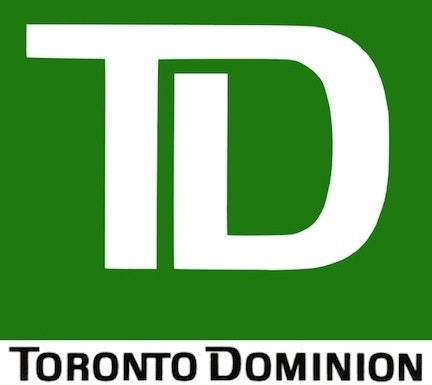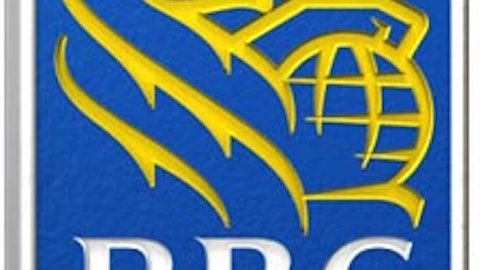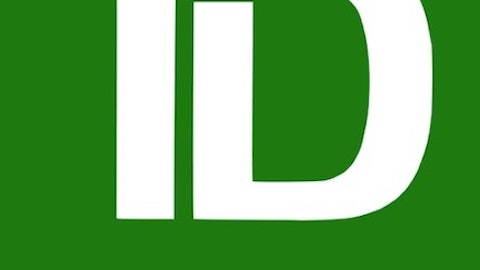Since 1790, the American bank Bank of Montreal (USA) (NYSE:BMO)ing system has experienced sixteen different financial crises, in contrast, the Canadian banking system has experienced none so far. This makes a big statement to potential investors about the stability of the Canadian financial system over the tumultuous American banking system.
The recent subprime crisis, which led to a global economic meltdown eventually resulted in heavy losses for American banks, and ultimately the collapse of Lehman Brothers as well as many other smaller banks. Nonetheless, the Canadian banks weathered the storm extremely successfully. It is noteworthy that the Canadian financial system exhibited its sparkling ability to manage money, which was even acknowledged by U.S President Barack Obama.
Robust fundamentals
Toronto-Dominion Bank (USA) (NYSE:TD) is a Canadian multinational financial services corporation headquartered in Toronto. It is the Sixth largest bank in North America by market capitalization, and second largest bank by assets amongst its Canadian Peers.
The bank, with its carefully designed segment portfolio, has demonstrated consistent growth over the past five years, with adjusted earnings and earnings per share growing at a CAGR of 11% and 5% respectively.The total shareholder return has exhibited a CAGR of 10% during the past ten years.
In addition, the bank has a history of consistent dividend payouts, with an 11% annual growth in dividends of over the past twenty years. The second quarter results were solid, with earnings from retail business amounting to $1.6 billion, taking the total earnings of the bank to an impressive $ 1.8 billion, a 6% Year-on-Year growth.
It should be noted by potential investors that BASEL III norms essentially deals with strengthening the banks financial system by pressing standards for Capital adequacy, stress testing, and market liquidity risk. The BASEL III common equity Tier 1 ratio stands at 7%, whereas Toronto Dominion’s ratio stands at around 8.8%, which further underpins the financial strength of the institution.
Strategic acquisitions to expand footprint
Moving further, the bank has made several initiatives in order to expand its base in the US. Toronto-Dominion Bank (USA) (NYSE:TD) recently closed its acquisition of U.S.-based Epoch Holding, and its fully owned subsidiary Epoch Investment Partners, for a mammoth $669 million in cash. The closure of this deal reinforces the company’s strategy to expand its footprint in the U.S. wealth management sector.
Toronto-Dominion Bank (USA) (NYSE:TD) further acquired the credit card portfolio from Target Corporation (NYSE:TGT) for a whopping $5.9 billion, by entering into a seven-year agreement which makes it an exclusive issuer of Target Corporation (NYSE:TGT)-branded Visa and private label consumer credit cards to its U.S. consumers.
Such acquisitions vividly exhibit Toronto-Dominion Bank (USA) (NYSE:TD)’s approach towards establishing its name in the U.S. market.
Competitive landscape of Canadian banks
Toronto-Dominion Bank (USA) (NYSE:TD) has several competitors in the banking sector, however, its main competitors are Royal Bank of Canada (NYSE:RY), The Bank of Nova Scotia (USA) (NYSE:BNS) and Bank of Montreal (USA) (NYSE:BMO)
Royal Bank of Canada (NYSE:RY), commonly called RBC, is the largest bank in Canada with a market capitalization of $87 billion. During the second quarter of 2013, the company posted an adjusted net income of $1.97 billion, which is a 13% year-on-year increase. The growth reported in the net income was predominantly due to robust performance in all business segments and an overall optimism in the Canadian market.
Furthermore, by reporting an all-in capital equity tier I ratio of 9%, which is significantly above the minimum requirements pronounced by the BASEL III norms, the bank has clearly showcased its financial stability.
Royal Bank of Canada (NYSE:RY) is fairly active with its M&A strategy, as it recently acquired Ally Financial’s Canadian unit for $3.7 billion, which will bolster the company to a leadership position in the Canadian automotive finance segment.




